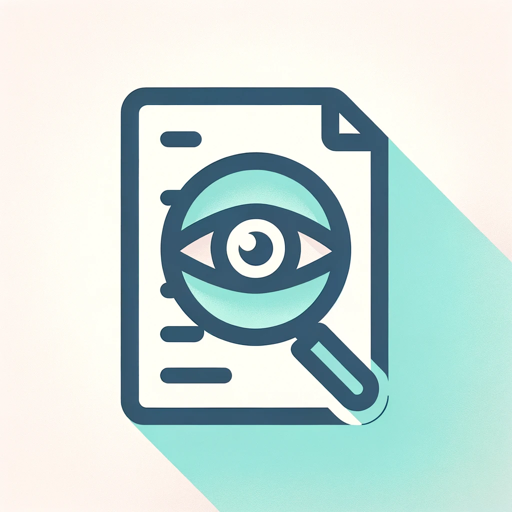GeoGPT-AI-powered geographical insights
AI-Powered Geographical Expertise
Describe the theory of continental drift.
What is the role of geography in sustainable development?
How do climatic zones affect biodiversity?
Analyze the impact of globalization on cultural landscapes.
Related Tools
Load More20.0 / 5 (200 votes)
Introduction to GeoGPT
GeoGPT is a specialized version of ChatGPT tailored to provide comprehensive geographical knowledge. Designed to draw from academic literature, scholarly articles, research papers, and authoritative geography textbooks, GeoGPT aims to deliver detailed and accurate answers on a wide range of geographical topics. It can address historical phenomena, current environmental issues, and theoretical models in geography, making it an invaluable tool for anyone seeking in-depth understanding. For instance, a student researching the impacts of climate change on coastal erosion can use GeoGPT to access detailed studies and data, while a policymaker might consult it for insights on sustainable urban planning.

Main Functions of GeoGPT
Educational Support
Example
Providing detailed explanations of geographical concepts and phenomena.
Scenario
A high school teacher uses GeoGPT to explain the water cycle to students, including how different factors such as temperature and topography affect precipitation patterns.
Research Assistance
Example
Offering insights from recent research papers and academic studies.
Scenario
A university student writing a thesis on deforestation can use GeoGPT to find the latest research on deforestation rates in the Amazon rainforest, including causes and potential solutions.
Policy Development
Example
Delivering data and analysis for informed decision-making.
Scenario
A city planner might use GeoGPT to gather information on urban heat islands, helping to develop green space initiatives to mitigate these effects.
Ideal Users of GeoGPT Services
Students and Educators
GeoGPT provides detailed, accurate information that is crucial for learning and teaching. Students can use it for research projects and understanding complex topics, while educators can enhance their lesson plans with comprehensive geographical data.
Researchers and Academics
Researchers benefit from GeoGPT's extensive database of scholarly articles and studies, facilitating access to current research and theoretical models. This can aid in literature reviews, data analysis, and the development of new research proposals.
Policy Makers and Urban Planners
GeoGPT assists in the formulation of policies and planning strategies by providing in-depth analysis and data on environmental issues, urban development, and sustainability practices, ensuring decisions are well-informed and evidence-based.

How to Use GeoGPT
1
Visit aichatonline.org for a free trial without login, no need for ChatGPT Plus.
2
Ensure you have a clear and specific geographical question or topic in mind to maximize the relevance of the response.
3
Input your query into the chat interface. Be as detailed as possible to receive a comprehensive answer.
4
Review the provided response carefully. If needed, ask follow-up questions for further clarification or additional information.
5
Utilize the gathered information for your research, academic work, or personal knowledge. For optimal experience, ensure a stable internet connection and a distraction-free environment.
Try other advanced and practical GPTs
Esports Logo Creator
AI-powered esports logos, personalized for you.

UX/UI Designer | Roast my web and saas
AI-powered design critique tool

Design Systems Guide
AI-powered Design System Creation

Pine Script Pro
AI-powered Pine Script coding assistant.

Social Media Guru
AI-Powered Social Media Strategy.

STM32编程大师
AI-powered STM32 programming solutions

Geeky Gary
AI-powered insights with personality

Anatomy Illustrator
AI-powered anatomical illustrations for everyone

Dr. Data
AI-powered insights for data-driven decisions.

OCR
AI-powered OCR for precise text extraction.

ABP (Aprendizaje Basado en Proyectos) - ProfesTV
AI-powered Project-Based Learning for Educators

API Guardian
AI-powered security for your APIs

- Research
- Education
- Exam Prep
- Analysis
- Insights
GeoGPT Q&A
What is GeoGPT designed for?
GeoGPT is designed to provide detailed and accurate geographical knowledge sourced from academic literature, research papers, and authoritative geography books. It covers a wide range of topics from historical geographical phenomena to current environmental issues and theoretical models.
How can GeoGPT assist in academic research?
GeoGPT offers in-depth analyses and well-established facts on various geographical concepts and findings. It helps in gathering comprehensive information for research papers, understanding complex geographical models, and staying updated with the latest developments in the field.
Can GeoGPT help with environmental issue queries?
Yes, GeoGPT can provide detailed insights into current environmental issues, including climate change, sustainability practices, and ecological impacts. It draws from up-to-date research and authoritative sources to offer accurate and reliable information.
What makes GeoGPT reliable?
GeoGPT is built on a vast database of scholarly articles, research papers, and comprehensive textbooks. Its responses are grounded in well-established facts and theories, ensuring the information provided is trustworthy and scholarly.
What are some common use cases for GeoGPT?
Common use cases include academic writing, preparing for exams, conducting research, understanding complex geographical models, and staying informed about environmental issues. GeoGPT serves as a valuable resource for students, researchers, and geography enthusiasts.